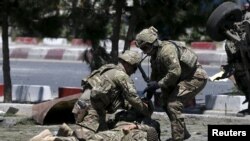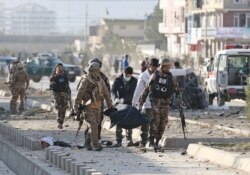The Washington Post newspaper has published a trove of government documents that reveal senior U.S. officials misled the public about the 18-year war in Afghanistan by making overly optimistic pronouncements they knew to be false and hiding evidence that the conflict had become unwinnable.
The Post says the documents contain more than 400 interviews with senior military and government insiders who offered unrestrained criticism of what went wrong in Afghanistan and how the United States became mired in nearly two decades of war.
According to the Post, U.S. officials, most of whom spoke on the assumption that their remarks would not be made public, acknowledged the strategies for fighting the war were flawed and the U.S. wasted hundreds of billions of dollars trying to make Afghanistan into a stable, democratic nation. The Post said the interviews also highlight botched U.S. attempts to reduce corruption, build a competent Afghan army and reduce the country's opium trade.
U.S. Presidents George W. Bush, Barack Obama and Donald Trump all vowed they would avoid becoming mired in "nation building" in Afghanistan; however, the report shows how even from the early days of the war, senior officials in charge of directing U.S. policy in the country expressed confusion about Washington's basic objectives and strategy for achieving them.
The Pentagon has not responded to the documents published by the Post, which waged a legal battle for three years to force the government to disclose the information because of its importance to the public.
The Afghan war is estimated to have killed more than 150,000 people, including civilians, insurgents, local and foreign troops, since the U.S. and its allies invaded 18 years ago to oust the Taliban from power for sheltering al-Qaida leaders accused of plotting the September 2001 terrorist strikes on the U.S.
The conflict has claimed the lives of more than 2,400 U.S. service members and cost Washington nearly $1 trillion.
The U.S. and the Afghan Taliban restarted peace negotiations on Saturday, three months after President Trump abruptly stopped the yearlong process aimed at finding a political settlement with the insurgent group and ending the war in Afghanistan.
The Afghan-born U.S. special reconciliation representative, Zalmay Khalilzad, led his team at a meeting Saturday in Doha, the capital of Qatar, where insurgent negotiators are based.
The draft agreement the U.S.-Taliban negotiations had produced before Trump called off the process on September 7 would have set the stage for a phased withdrawal of U.S. forces from Afghanistan.
The Taliban in return had given counterterrorism guarantees and promised to engage in intra-Afghan peace negotiations to permanently end decades of hostilities in the country.
VOA's Ayaz Gul contributed to this story from Pakistan.











